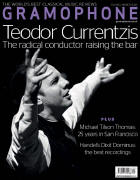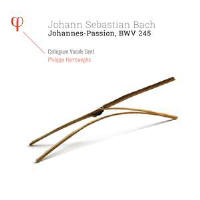Texte paru dans: / Appeared in: |
|
 |
Outil de traduction (Très approximatif) |
|
Reviewer:
Jonathan
Freeman-Attwood Over the years Philippe Herreweghe has moved freely between the first and second of Bach’s St John Passion scores, composed for Leipzig Easters in 1724 and 1725. The main differences lie in Bach’s jettisoning a number of arias in the second version and, most controversially, replacing the iconic opening movement with the chorale fantasia ‘O Mensch, bewein’, which the composer later redeployed to close Part 1 of the St Matthew. How the choice of version affects the unfolding of the drama in Bach’s most unvarnished oratorio is hard to gauge, though on the basis of Herreweghe’s three recorded accounts – 1987, 2001 and this one – it’s the first and most recent (both employing the original musical text) which seem the most convincing in the collective investment of the narrative. The start here is indeed ominously impressive, all of Collegium Vocale’s collective experience yielding a palate of resonating imagery, rooted in portentous inevitability and prescient shards of light. Even in the most graphic turba (crowd) scenes, Herreweghe resists obvious projection for something which the listener can ‘imagine’ rather than just ‘feel’. If the aesthetic of this work seems especially suited to Herreweghe’s madrigalian sensibilities, it becomes clear that there is no magic bullet to the distinctiveness and success of this performance. The command of integrated elements lies partly in its buoyant and unhurried pacing, but also in the mix of glowingly etched chorales (what textural refinement!), arias presented as handsomely discrete ‘scenas’, gloriously varied turbae interpolations and illuminating storytelling by Maximilian Schmitt’s Evangelist. The deft release of emotional adrenalin is evident in the arrival of ‘Ach mein Sinn’, after Peter’s denial at the end of Part 1. It is quite overwhelming, especially in the heartfelt hands of Robin Tritschler. Contributing to the discerning unity of vision and character of this performance is how the instruments sit embedded at the heart of the vocal sound. The presence of instrumental character provides a foil for the kind of vocal charisma which, if too prominent in this work, can wrong-foot a particular conceit. For instance, the blind discipleship of ‘Ich folge’, sung here winningly by Dorothee Mields, is given the kind of devotional innocence of a young prayer group, with the flute’s closely argued and irradiating roulades, supported by a gently encouraging lute. Peter Kooij sounds almost as evergreen as he did in 1987, and Damien Guillon’s ‘Es ist vollbracht’ is simply exquisite. In an embarras de richesses of solo meditations, Mields’s account of ‘Zerfliesse’ is a lament of supreme delicacy, hovering above gurgling reeds of their own mourning – a small selection of the wonders here. This is indeed one of the most thoughtful, affecting and powerful St John Passions in recent years. It reveals the mature mastery of Herreweghe at his most perspicacious and consistent, with Collegium Vocale Gent paving the way with gold. |
|




